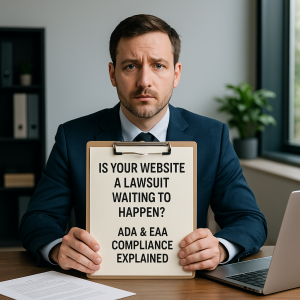In today’s increasingly digital world, your website is often the first impression your business makes. But what happens when that first impression unintentionally excludes millions of people with disabilities? Beyond the ethical implications, the legal risks are real—and they’re growing.

The Americans with Disabilities Act (ADA) and the European Accessibility Act (EAA) are two major legislative efforts designed to ensure that everyone, regardless of ability, can access digital services and products. If your website isn’t accessible, you could be putting your business at risk for legal action, financial penalties, and damage to your reputation.
The Legal Landscape: ADA and EAA Explained
The ADA (Americans with Disabilities Act) was enacted in 1990 to prohibit discrimination against individuals with disabilities in all areas of public life. Over time, the law has evolved to include digital spaces—websites, mobile apps, and digital services are now expected to be accessible. Americans with Disabilities Act compliance is a necessary condition today to for any company doing business online in the U.S.
While the ADA doesn’t list specific technical standards, U.S. courts have overwhelmingly adopted the Web Content Accessibility Guidelines (WCAG) as the benchmark. Section 508 of the Rehabilitation Act of 1973, as amended, incorporates the Web Content Accessibility Guidelines (WCAG) 2.0, Level A and AA, for web-based content. Sites that don’t meet WCAG Level AA standards may be found non-compliant.
The EAA (European Accessibility Act), on the other hand, sets clear accessibility requirements for digital products and services offered in the EU. It goes into effect on June 28, 2025, giving businesses a limited window to get compliant.
The Risks of Non-Compliance
Failing to comply with ADA or EAA regulations can lead to serious consequences:
- Lawsuits and Settlements: Thousands of U.S. businesses are sued every year over inaccessible websites. According to UsableNet, over 67% of these lawsuits target companies with less than $25 million in revenue.
- Fines and Enforcement Actions: Government bodies in the U.S. and EU can impose financial penalties on non-compliant businesses.
- Reputational Damage: News of a lawsuit can spread quickly, harming your brand and alienating customers.
- Lost Revenue Opportunities: If your website isn’t accessible, you’re turning away millions of potential users with disabilities—not to mention missing out on SEO and usability benefits.
Why Small Businesses Are Especially Vulnerable
Small and mid-sized businesses are often the most targeted for ADA lawsuits. Why? Because they typically lack in-house accessibility experts and may assume they’re “too small to matter.” But that’s a costly mistake.
The data is clear:
- 41% of companies hit with an ADA lawsuit have already faced a similar suit in the past.
- E-commerce, hospitality, and service-based businesses are among the most frequently targeted.
What Does Web Accessibility Mean?
Web accessibility ensures that people with visual, auditory, motor, or cognitive impairments can fully engage with your digital content. This includes:
- Using screen readers
- Navigating by keyboard
- Accessing transcripts or captions for audio/video content
- Understanding content through clear, consistent design
Accessibility is measured against WCAG (Web Content Accessibility Guidelines), currently at version 2.2. These guidelines are divided into four principles: Perceivable, Operable, Understandable, and Robust (POUR).
Reguweb Makes Compliance Simple
That’s where Reguweb comes in. We help businesses of all sizes—whether you’re a direct website owner or a digital agency—achieve and maintain ADA compliance, EAA compliance, and WCAG compliance through a streamlined, affordable platform.
With Reguweb, you get:
- Automated Accessibility Scans: Quickly identify critical issues like missing alt text, low color contrast, and inaccessible forms.
- Manual Audits by Experts: Our specialists validate and dig deeper into issues that tools can’t catch.
- Comprehensive Reports: Actionable insights that show you exactly what needs fixing.
- Accessibility Widget: A user-facing tool that enhances navigation and content consumption for people with disabilities.
- Ongoing Monitoring: Stay compliant as your content evolves with daily scans and alerts.
Why It’s Smart Business
Web accessibility isn’t just about compliance—it’s about opportunity:
- Expand Your Audience: Reach over 1 billion people globally who experience some form of disability.
- Improve SEO: Google favors accessible websites.
- Boost Usability: Accessibility features often improve the experience for all users, especially on mobile devices.
- Protect Your Brand: Demonstrating inclusivity and legal awareness enhances your reputation.
Start with a Free Audit
Not sure where your site stands? Reguweb offers a 14-day free trial. Scan your site, get your report, and see the value of a fully compliant, inclusive digital experience.
Accessibility is no longer optional. It’s a business imperative. And with Reguweb, it’s easier than ever to protect your company while doing the right thing.
👉 Visit reguweb.com to start your free audit today.
